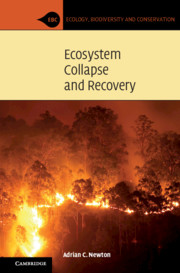Conservation Politics
The Last Anti-Colonial Battle
£34.99
- Author: David Johns, Portland State University
- Date Published: April 2019
- availability: In stock
- format: Paperback
- isbn: 9781316648933
£
34.99
Paperback
Other available formats:
Hardback, eBook
Looking for an inspection copy?
This title is not currently available on inspection
-
Whilst the science of conservation biology is thriving as a discipline, ultimately global conservation is failing. Why, when the majority of people say they value nature and its protection? David Johns argues that the loss of species and healthy ecosystems is best understood as human imposition of a colonial relationship on the non-human world - one of exploitation and domination. Global institutions benefit from transforming nature into commodities, and conservation is a low priority. This book places political issues at the forefront, and tackles critical questions of conservation efficacy. It considers the role of effective influence on decision making, key policy changes to reduce human footprint, and the centrality of culture in mobilising support. It draws on political lessons from successful social movements, including human anti-colonial struggles, to provide conservation biologists and practitioners in scientific and social science disciplines and NGOs with the tools and wider context to accelerate their work's impact.
Read more- Provides conservationists with effective tools and strategic approaches for gaining wider and deeper support for their work, including how to create effective and sustained influence on decision making
- Advocates a cross disciplinary approach to conservation, combining scientific and political awareness of the causes of biodiversity, wildlands and oceans loss and the central importance of changing institutional behaviour attitudes
- Identifies the attributes of successful social movements, such as civil rights in the US and feminism, and details what the conservation movement can learn from these
Reviews & endorsements
'Bruce Babbit, when he was Secretary of the Interior, was fond of saying to conservationists, 'Don't expect me to do the right thing, make me do it'. Conservationists made impressive strides after Rachel Carson's 'Silent Spring', by relying on passion and persuasion, but little progress has been made since the 1970s, as corporate opposition has coalesced into a powerful counter-movement. Meanwhile, with shrinking opportunities for habitat protection and the looming specter of climate change, the need for further progress is greater than ever. David Johns, a political scientist with a deep interest in popular movements, makes the case that conservation will only return to the forefront of the nation's agenda when citizens mobilize into a vigorous movement with the energy to elect advocates to positions of political power. His new book offers deep insights into how to achieve this goal.' John W. Terborgh, Duke University, North Carolina
See more reviews'The scientific case has been made. Poets have spoken with deep feeling. Now comes the hard part. In this well-written and very timely book, David Johns lays out the practical, political steps required to save the rest of life on Earth, and ultimately ourselves.' Edward O. Wilson, Harvard University, Massachusetts
'We the people must accept that any conservation activity of worth must be a political act. This is a simple but not a small idea. The insults foisted upon Mother Earth are so pervasive, that nothing less than the world's greatest collective action will suffice as redress. Politics is the only scheme that can organize and advance such action. David Johns writes clearly to this end from the hard ground of history and science. His book is a call to arms to use politics to promote peace, prosperity, and justice for all life. Let's hope that we the people heed the call. Every future depends on it.' Mike Phillips, Turner Endangered Species Fund, US
'David Johns has done it again! The author of A New Conservation Politics brings his wide knowledge of the conservation movement and other social movements to provide practical insights on how to make conservation more effective. This book fills a critical gap in the conservation literature by explaining how to overcome the political obstacles to conservation. For those who care about the extinction crisis he offers a path to action beyond business-as-usual. In the end, conservation is too complex to leave it to scientists, and much too important to leave it to politicians. He combines both worlds into a powerful mix.' Ignacio Jiménez Pérez, The Conservation Land Trust, Argentina
'In the 30 years I've worked with Dave Johns for things wild and free, I've seen him become a leading activist on the visionary cutting edge of rewilding and also as our deepest thinker on effective activism. Witness his latest book.' Dave Foreman, Earth First!, US
Customer reviews
Not yet reviewed
Be the first to review
Review was not posted due to profanity
×Product details
- Date Published: April 2019
- format: Paperback
- isbn: 9781316648933
- length: 398 pages
- dimensions: 227 x 153 x 21 mm
- weight: 0.57kg
- contains: 11 b/w illus.
- availability: In stock
Table of Contents
Introduction
Part I. The Problem:
1. The tragedy of political failure
2. Like it or not, politics is the solution
Part II. Getting the Questions Right:
3. Ten questions for conservation politics
4. Adapting society to the wild
5. Striking at the roots
6. Domination and the intractability of energy problems
Part III. Taking the Offensive:
7. Turning the tide
8. Lessons from large scale conservation
9. Doing large-scale restoration
10. The other connectivity
11. The special challenge of marine conservation
12. The biological sciences and conservation
Part IV. Culture Change:
13. Conservation, George Orwell and language
14. Restoring story and myth
15. Conservation's moral imperative
Conclusion.
Sorry, this resource is locked
Please register or sign in to request access. If you are having problems accessing these resources please email [email protected]
Register Sign in» Proceed
You are now leaving the Cambridge University Press website. Your eBook purchase and download will be completed by our partner www.ebooks.com. Please see the permission section of the www.ebooks.com catalogue page for details of the print & copy limits on our eBooks.
Continue ×Are you sure you want to delete your account?
This cannot be undone.
Thank you for your feedback which will help us improve our service.
If you requested a response, we will make sure to get back to you shortly.
×









